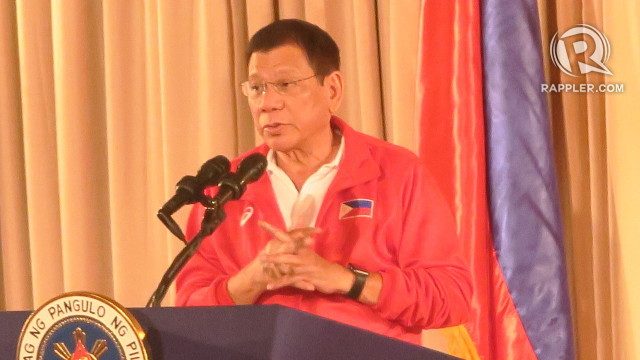SUMMARY
This is AI generated summarization, which may have errors. For context, always refer to the full article.

MANILA, Philippines – Let’s talk.
This is the message of several environment groups and advocates to President Rodrigo Duterte on Tuesday, July 19, after his announcement that his administration will not honor the international agreements binding the Philippines to limit its carbon emissions.
“We are willing to sit down with him to discuss the comprehensiveness of the Philippine position and the Paris agreement,” Rodne Galicha of the Climate Reality Project Philippines said.
While the president failed to specify the agreement, he was likely referring to the Paris Agreement on Climate Change. In December 2015, the Philippines pledged its support to the Paris agreement during the United Nations Framework Convention on Climate Change 21st Conference of Parties (COP21) held in France. (READ: PH on Paris climate pact: Monumental feat for humanity)
Understandable, but…
For Duterte, however, the climate agreement, in a way, limits the economic growth of developing nations that have pledged to support it, the Philippines included.
“You are trying to stymie us with an agreement na ganito lang kayo (that you will stay this way)…That’s stupid. I will not honor that. Sabi niya (He said), you signed. That was not my signature,” said the Philippine president during a meeting with Philippine Olympic athletes on Monday, July 18.
While he disagrees with Duterte’s decision, former lead climate change negotiator of the Philippines Naderev “Yeb” Saño said he understood where the president’s sentiment is coming from. (READ: 8 reasons why PH should honor climate commitments)
“Climate change is a complex political issue that requires reflection from the point of view of climate justice. As such, since climate change was largely caused by rich countries, fairness dictates that they shall have a larger share of the responsibility in solving the problem,” Sano, who is now the executive director of Greenpeace Southeast Asia, said.
This was echoed by Francis dela Cruz, associate for Energy Policy at the Institute for Climate and Sustainable Cities, when he said that Duterte was correct in putting the “spotlight on the hypocrisy of industrialized nations, which should carry much of the climate burden.”
“The science is in and there is no debate that countries from all over the world should unite towards full decarbonisation if we are to maintain the Earth’s global average temperature well below the dangerous level of 1.5 degrees Celsius,” SANLAKAS Secretary-General Aaron Pedrosa added.
Highly industrialized countries like China, the United States, Japan, India and other oil-producing Gulf nations account for almost 70% of the greenhouse gas emissions in 2011.
During the climate talks, nations most vulnerable to climate change lobbied hard for wording to limit global warming to 1.5 Celsius. Big polluters, such as China, India and oil producing-giant Saudi Arabia, however, preferred a ceiling of 2C. A higher ceiling would have enabled them to burn fossil fuels for longer.
PH’s important role
Advocates and groups, however, urge the president to look at the role of the Philippines in the global climate pact.
“It will be critical to continue to engage in the UNFCCC negotiating process so that the Philippines can influence the level of ambition, the targets and rules of climate action that benefit vulnerable countries most,” Dela Cruz added.
The Philippines heads the Climate Vulnerable Forum, a group of 20 countries most vulnerable to climate change. While they were not a negotiating group in the Paris climate talks, the CVF lobbied hard for policies such as the 1.5-degree target, full decarbonization of the world economy, 100% renewable energy by 2050, and zero emissions by mid-century.
“In order for countries like the Philippines to survive the devastating impacts of climate change and stay below dangerous levels of climate change (stay below 1.5 C), global emissions need to be reduced. The carbon reduction commitments remain differentiated respecting national conditions, and taking into account the development needs of developing countries,” Dela Cruz added.
Development without coal
Aside from supposedly limiting the country’s economic growth, Duterte claimed that the climate change agreements are another way by which developed countries are able to “dictate the destiny” of poorer nations.
But environment groups and advocates denied this, reminding the president that development need not be dirty. Saño also claimed that the climate solutions will not constrain the country’s development.
“The 200,000 MW projected capacity of renewable energy is more than enough to sustain the needs of the Philippines for an even more sustainable development path than what industrialized countries have followed before,” Gerry Arances of the Center for Energy, Ecology and Development said.
This climate agreement is a promising opportunity for the country, Arances also argued.
“Rather than follow in the footsteps of climate-hypocrites, we must walk our talk in terms of our contribution to combat climate change while pursuing our need for a more sustainable, cleaner and people-centered development path,” Arances said.
Hailed as the first universal, legally-binding agreement on climate change, the climate deal has been signed by 175 countries who pledged to reduce the amount of carbon they emit and to ensure their citizens are prepared for the effects of global warming. (READ: Full text of the Paris agreement)
By being one of its signatories, the Philippines has promised to reduce its carbon emissions by 70% by the year 2030, with aid from the international community. – Rappler.com
Add a comment
How does this make you feel?
There are no comments yet. Add your comment to start the conversation.